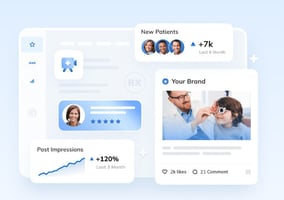In today's globalized economy, businesses are increasingly turning to nearshore development as a...
Unlocking the Potential of Custom AI Software
Introduction
In today's fast-paced digital landscape, businesses are constantly seeking innovative solutions to stay ahead of the curve. One such groundbreaking technology is custom AI software, which offers tailored artificial intelligence solutions to address specific business needs. From enhancing productivity to optimizing processes, the potential of custom AI software is limitless. In this comprehensive guide, we delve deep into the world of custom AI software, exploring its capabilities, applications, and benefits.
Understanding Custom AI Software
Custom AI software represents a tailored approach to artificial intelligence, where algorithms and models are designed to meet the unique requirements of individual businesses. Unlike off-the-shelf solutions, custom AI software is crafted specifically to address the challenges and opportunities within a particular industry or organization. By leveraging advanced machine learning techniques, custom AI software can analyze vast amounts of data, uncover valuable insights, and make intelligent predictions.
The Evolution of Artificial Intelligence
Artificial intelligence has undergone a remarkable evolution in recent years, fueled by advancements in machine learning, deep learning, and natural language processing. From basic rule-based systems to sophisticated neural networks, AI technologies have become increasingly capable of emulating human intelligence across a wide range of tasks. This evolution has paved the way for the development of custom AI software, enabling businesses to harness the full potential of artificial intelligence for their specific needs.
Key Components of Custom AI Software
Building effective custom AI software requires a careful combination of key components, including data collection, preprocessing, model training, and deployment. Each stage of the development process plays a critical role in ensuring the success of the AI solution. Data collection involves gathering relevant datasets from various sources, while preprocessing involves cleaning, formatting, and preparing the data for analysis. Model training entails selecting the appropriate algorithms and fine-tuning them using the collected data. Finally, deployment involves integrating the trained models into existing systems and workflows.
Challenges and Considerations
While custom AI software offers tremendous potential, it also presents unique challenges and considerations. One of the primary challenges is data quality and availability, as AI models rely heavily on large, high-quality datasets for training and validation. Additionally, developing custom AI software requires expertise in machine learning, software development, and domain knowledge, making it essential to assemble a skilled team of professionals. Furthermore, ensuring the ethical and responsible use of AI technologies is paramount, as they have the potential to impact society in profound ways.
Applications of Custom AI Software
The versatility of custom AI software lends itself to a wide range of applications across various industries. From healthcare and finance to retail and manufacturing, businesses are leveraging custom AI solutions to drive innovation and achieve competitive advantage.
1. Healthcare
In the healthcare sector, custom AI software is revolutionizing patient care, diagnosis, and treatment planning. By analyzing medical images, genomic data, and electronic health records, AI algorithms can assist healthcare professionals in diagnosing diseases, predicting patient outcomes, and personalizing treatment plans. Additionally, AI-powered chatbots and virtual assistants are enhancing patient engagement and providing round-the-clock support.
2. Finance
In the finance industry, custom AI software is reshaping how financial institutions manage risk, detect fraud, and optimize investments. AI algorithms can analyze vast amounts of financial data in real-time, identify patterns and anomalies, and make data-driven decisions with speed and accuracy. From algorithmic trading and credit scoring to anti-money laundering and regulatory compliance, AI-powered solutions are driving efficiency and mitigating risks in the financial sector.
3. Retail
In retail, custom AI software is enhancing the customer experience, optimizing inventory management, and driving sales growth. AI-powered recommendation engines analyze customer preferences and purchase history to deliver personalized product recommendations, increasing customer engagement and loyalty. Moreover, AI-driven supply chain optimization tools help retailers forecast demand, streamline logistics, and minimize inventory costs, leading to improved operational efficiency and profitability.
4. Manufacturing
In the manufacturing sector, custom AI software is revolutionizing production processes, quality control, and predictive maintenance. AI-powered predictive analytics can anticipate equipment failures, identify maintenance needs, and schedule repairs proactively, minimizing downtime and maximizing productivity. Furthermore, AI-enabled robotics and automation systems are improving efficiency and safety on the factory floor, enabling manufacturers to achieve higher levels of precision and flexibility.
Benefits of Custom AI Software
The adoption of custom AI software offers numerous benefits for businesses, ranging from increased efficiency and productivity to enhanced decision-making and innovation.
1. Enhanced Efficiency
By automating repetitive tasks and streamlining processes, custom AI software enables businesses to operate more efficiently and allocate resources effectively. By reducing manual intervention and optimizing workflows, AI solutions can drive significant cost savings and improve overall productivity.
2. Improved Decision-Making
Custom AI software empowers businesses with actionable insights and predictive analytics, enabling more informed decision-making. By analyzing complex datasets and identifying patterns and trends, AI algorithms help businesses anticipate market changes, identify opportunities, and mitigate risks in real-time.
3. Personalized Experiences
By leveraging data analytics and machine learning, custom AI software enables businesses to deliver personalized experiences to their customers. From tailored product recommendations to customized marketing campaigns, AI-powered solutions help businesses engage with customers on a deeper level, fostering loyalty and satisfaction.
4. Competitive Advantage
In today's competitive landscape, staying ahead of the curve is essential for business success. Custom AI software provides businesses with a competitive advantage by enabling them to innovate faster, adapt to changing market conditions, and deliver superior products and services to their customers.
FAQs (Frequently Asked Questions)
Here are some common questions about custom AI software:
-
What is custom AI software? Custom AI software refers to tailored artificial intelligence solutions designed to meet the specific needs of individual businesses or industries. Unlike off-the-shelf solutions, custom AI software is customized to address the unique challenges and opportunities within a particular organization.
-
How does custom AI software differ from off-the-shelf solutions? Off-the-shelf AI solutions are pre-built and designed to address general use cases, whereas custom AI software is tailored to meet the specific requirements of a particular business or industry. Custom AI software offers greater flexibility, scalability, and customization options, allowing businesses to achieve more precise results and better outcomes.
-
What are the key components of custom AI software? The key components of custom AI software include data collection, preprocessing, model training, and deployment. Each stage of the development process plays a critical role in ensuring the success and effectiveness of the AI solution.
-
What are some common applications of custom AI software? Custom AI software finds applications across various industries, including healthcare, finance, retail, and manufacturing. In healthcare, AI algorithms assist in diagnosis, treatment planning, and patient care. In finance, AI solutions are used for risk management, fraud detection, and investment optimization. In retail, AI-powered recommendation engines enhance the customer experience, while in manufacturing, AI-enabled predictive maintenance improves operational efficiency.
-
What are the benefits of custom AI software for businesses? Custom AI software offers several benefits for businesses, including enhanced efficiency, improved decision-making, personalized experiences, and a competitive advantage. By automating processes, providing actionable insights, and delivering personalized experiences, AI solutions enable businesses to drive innovation, optimize operations, and achieve growth.
-
How can businesses leverage custom AI software effectively? To leverage custom AI software effectively, businesses should first identify their specific needs and objectives. They should then collaborate with experienced AI developers and data scientists to design and develop tailored solutions that address their unique challenges and opportunities. Continuous monitoring, evaluation, and optimization are also essential to ensure the ongoing success and effectiveness of custom AI software implementations.
Conclusion
In conclusion, custom AI software represents a powerful tool for businesses seeking to harness the transformative potential of artificial intelligence. By tailoring AI solutions to meet their specific needs and objectives, businesses can unlock new opportunities, drive innovation, and gain a competitive edge in today's digital economy. As AI technologies continue to evolve and mature, the possibilities for custom AI software are limitless, offering endless possibilities for businesses across industries.


